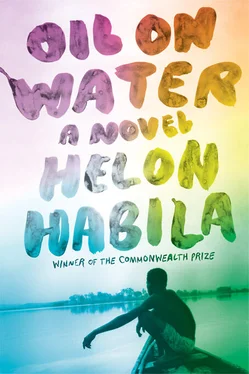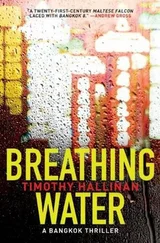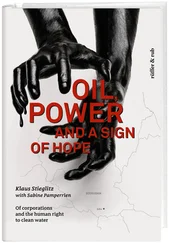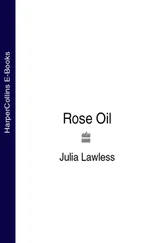As we passed the flood plain where Chief Ibiram’s village had once stood, I told the two men to slow down for a minute. The place looked desolate: the only signs that a community had once thrived here were a few sticks jutting out of the water, pieces of straw from roof thatches scattered in the mud and a pile of garbage under a tree, that was all.
WE CAUGHT UP with them very late in the afternoon — and by now I was almost fainting from fatigue and weakness. My guides had offered many times to stop and rest but I had insisted we keep going, and now they had to hold me under the arms as I got off the boat.
The group was camped in a forest not far from the river, where their boats, laden with their meager belongings, waited near the trees and rocks on the banks. They had set up tents and sheds, and curious faces peered out of the doorway slits as we passed, some nodding in recognition. Young men and women and children sat under trees, eating, or playing, or just idly waiting for nightfall, when they’d be on the move again. Chief Ibiram’s tent lay a few meters from the others.
— Good to see your face again, reporter.
— You too, Chief Ibiram.
He was seated on his reclining chair, his radio on a side table; I sat on a mat, facing him, and for a second it seemed time had not moved an inch since that day when the old man and his son had first brought Zaq and me to this community. The same cloth chair, the same radio by his side, and somewhere in an imaginary back room I could hear women and children talking and laughing. Only this time there was no Zaq, and this time it was I who was slumped and bowed like Zaq had been that day, and all alone. And the old man, Tamuno and his son Michael, where were they?
— They returned safely. They are fine. They are out there, somewhere.
— Good to hear that.
— And where is your friend, Zaq?
— I left him at Irikefe. He’s not well.
— You also don’t look well, reporter.
— I’ll be fine. I’m on my way to Port Harcourt, where I’ll see a doctor. And you, I see you are on the move again.
— Yes, we couldn’t remain there anymore. My people, they are frightened, the violence gets closer every day. We’ve heard of a place not too far from Port Harcourt, the people there are friendly, most of them are refugees like us. My people could get some sort of work in Port Harcourt.
His voice was hopeful, but his eyes were pessimistic, cloudy. Gradually the community was drifting toward the big city, and sooner or later it would be swallowed up, its people dispersed, like people getting off a bus and joining the traffic on the city streets. He sighed.
— You came for the white woman, didn’t you? Do you want to see her now?
— Can I?
At last I was going to see Isabel Floode, and I didn’t even have a pen or a notepad or my camera. I tried to control my nervousness as I followed Chief Ibiram out of his tent into the heat. She was in a tent by herself, seated on what looked like a folded trampoline; beside her was a half-covered bowl with a half-eaten meal in it. She was staring out to the trees through the door slit, and she didn’t seem at all surprised to see us; perhaps her recent experiences had exhausted her capacity for surprise — which I could understand. Now she looked up with a dull, locked-in expression, waiting for us to speak.
— This is Rufus, a journalist. He’s come to see you.
At the mention of “journalist” a spark of interest entered her eyes. His job done, Chief Ibiram nodded at me, turned and left us. Now I saw how thin she looked. Her hair had been chopped off and the jagged edges hung unevenly over her ears. An old red blouse that didn’t seem to belong to her hung from her shoulders, and her collarbones jutted out, stretching the skin. Her face was covered in rashes; the skin was still slightly discolored from whatever dye she had used to disguise her skin while making her escape from her kidnappers. But it was her eyes that expressed her situation best: they looked hollow, lusterless, and even when they rested directly on you, they did so bluntly, never cutting below the surface. She was about forty years old, but right now she looked ten years older.
— My name is Rufus. I’m from the Reporter.
— Hello. I’m Isabel Floode.
— Yes. Mrs. Floode, your husband sent me. . us. Me and a friend, though I’m alone here at the moment. We’ve been searching for you for more than two weeks now.
— James sent you?
— Yes. He sent us to see if you were alive and well, and
if possible to negotiate your ransom. . but now that you are free. .
— Yes, yes. I’m free.
I noticed that her attention kept wavering. Her eyes were still fixed at the little slit through which a line of light came into the tent, and I wondered what she was staring at outside, or if she was expecting something to come charging in. I felt awkward, unsure how to behave with her, what to say or ask. I had always imagined she’d be surrounded by gun-toting militants when I met her, and I had always assumed Zaq would be there with me and he’d do all the talking; not in my wildest imaginings did I ever see myself sitting less than a meter from her, alone in a tent by the river, carrying the burden of the conversation. But I was a reporter, and this was what reporters do — improvise, look confident and poised.
— Mr. Floode really wanted to be here himself, but because of security. .
She said nothing, and kept staring at the same spot.
— I know you’re tired; if you’d rather rest. .
Now she turned to me and I saw how my unexpected comment had taken her by surprise. She shook her head.
— No. I can talk. What do you want to know?
— Well, how did you do it? How did you manage to escape?
— It wasn’t that hard. Salomon was able to overpower the guard. He bashed him on the head with a stone, and we slipped away. I guess they weren’t expecting us to try something so crazy.
— Yes, Salomon, why did he help you escape? He kidnapped you in the first place, didn’t he?
— It’s complicated.
— What do you mean?
— He didn’t actually kidnap me.
— He didn’t? Well, the police are looking for him. He’s their primary suspect.
— Look, you’ll have to ask Salomon for some of the details of what happened that day. He’s out there somewhere. What I can tell you is what I know.
— Okay. That’s all right. Please go ahead, Mrs. Floode.
— Sorry. . I didn’t mean to snap at you, but everything is so. . I expected to die back there, you know. I still find it hard to believe I’m here, almost safe, on my way to Port Harcourt. When I decided to come to this country, the last thing on my mind was getting kidnapped. Of course, I had been advised about the risks of coming to Nigeria, to Port Harcourt. The embassy had shown me all the newspaper clippings about abducted foreigners, but I didn’t pay much attention. I was coming on a special mission. I was coming to save my marriage.
She paused and looked at me, her eyes still expressionless. I had read somewhere that she was a schoolteacher — perhaps her husband had told me — and her eyes made me feel like an erring student, waiting for judgment.
— Rufus, I’m telling you all this just to put everything into perspective. I know you must have risked a lot to be here, so you deserve to know everything. Perhaps my husband has told you some of it already, but it doesn’t matter. Though I expect you to use your judgment to know what to print and what to leave out.
I nodded. She turned away and continued her story.
She had met Floode at university. He was in his final year, and she was a year behind. They got married a year after she graduated. The first years were happy ones. He worked for a chemical company in London, but then he got his present job, and that was when things began to change. He was a gifted petroleum engineer, and his skills were in great demand. He began to travel a lot, and over the past three years he had lived in five different countries: Hong Kong, Indonesia, Canada, Netherlands and now Nigeria. At first she happily went with him to each new place, but after Canada she suddenly lost interest. Why go all that distance only to stay at home watching TV or shopping at the mall, never seeing him till late in the evenings? So when he got posted to the Netherlands, they decided it was best if she stayed with his mother in Newcastle. But six months later he was out of the Netherlands and on his way to Nigeria. When she asked him if he was happy with the way things were, if he would perhaps think of another line of work for the sake of their marriage, he told her Nigeria would be for only two years, and then he would retire. He was being paid a lot of money to go there because of the dangerous conditions. But then she met someone else. It was nothing serious, nothing actually happened, but it got her thinking.
Читать дальше












